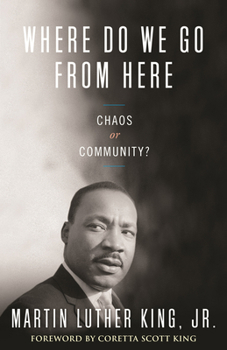Where Do We Go from Here: Chaos or Community?
(Book #2 in the King Legacy Series)
Select Format
Select Condition 
Book Overview
In 1967, Dr. Martin Luther King, Jr., isolated himself from the demands of the civil rights movement, rented a house in Jamaica with no telephone, and labored over his final manuscript. In this significantly prophetic work, which has been unavailable for more than ten years, we find King's acute analysis of American race relations and the state of the movement after a decade of civil rights efforts. Here he lays out his thoughts, plans, and dreams for America's future, including the need for better jobs, higher wages, decent housing, and quality education. With a universal message of hope that continues to resonate, King demanded an end to global suffering, powerfully asserting that humankind-for the first time-has the resources and technology to eradicate poverty.
Format:Hardcover
Language:English
ISBN:0807000760
ISBN13:9780807000762
Release Date:January 2010
Publisher:Beacon Press
Length:256 Pages
Weight:1.00 lbs.
Dimensions:1.0" x 5.7" x 8.6"
Customer Reviews
2 ratings
Civil Rights 1967
Published by Thriftbooks.com User , 20 years ago
Dr. King's penultimate book provides a snapshot of where we were in 1967. Two turning points had been reached. First, his program of nonviolent direct action was clearly winning the struggle against old fashioned southern segregation, and Dr. King was looking toward the next step. He believed that the next logical step toward setting people free was a massive government program addressing the problem of poverty. Second, within the civil rights movement, a "black power" mentality was gaining prominence. Some argued that whites should be excluded from the civil rights movement, and that nonviolence should be abandoned. Dr. King insisted that this approach would only balkanize our country, having disastrous effect, especially on blacks. As with his other books, the author's brilliance, his scholarship, and his Christian love all come through. It would be best to read "Stride Toward Freedom" and "Why We Can't Wait" before reading this one.
Martin's last words to America : Is anyone listening ?
Published by Thriftbooks.com User , 22 years ago
Many of those who claim to admire Dr. King and quote from his I have a dream speech seem to have never read his books. This book is the best of all the books King has written and probably the least read. In it, Dr. King critiques himself for giving the then youthful leaders of the Black Power Movement too overly optimistic views of the progress of integration. He also presents the pros and cons of Black Power. He states the need for White America to do much more to improve race relations other than declaring racism to be wrong. He calls for the teaching of African-American history, and for the nation to focus more on helping the poor over military spending. This book should be mandatory reading for high school students, college students, teachers, public officials and business leaders.






